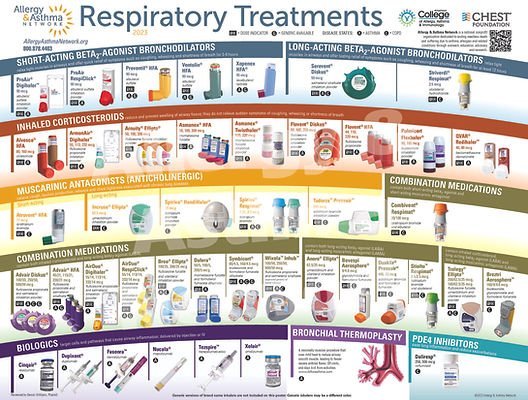
If you or a loved one are living with a chronic respiratory condition, you may often find yourself wondering if there are any new medications available to help manage the symptoms. The good news is that medical advancements continue to provide hope for those struggling with conditions such as asthma, chronic obstructive pulmonary disease (COPD), and cystic fibrosis. In this article, we will explore the latest developments in pharmaceutical research and highlight some promising new medications that could potentially revolutionize the way we approach the treatment of chronic respiratory conditions. So, sit back, relax, and let’s discover what the future may hold for individuals in need of effective respiratory medication.
New Medications for Chronic Respiratory Conditions
Introduction to Chronic Respiratory Conditions
Chronic respiratory conditions, such as asthma, chronic obstructive pulmonary disease (COPD), and cystic fibrosis, pose significant challenges to individuals who suffer from them. These conditions can have a profound impact on one’s quality of life, making it difficult to breathe and carry out daily activities. Managing these conditions often involves a combination of medication, lifestyle changes, and regular doctor visits. While there have been advancements in treatment options in recent years, researchers continue to develop new medications and therapies that target the underlying causes of these conditions.
Current Challenges in Managing Chronic Respiratory Conditions
Managing chronic respiratory conditions can be a complex task. One of the challenges is the heterogeneity of these conditions, with different individuals experiencing varying symptoms and levels of severity. Additionally, the effectiveness and tolerability of existing medications can vary among patients. Adherence to treatment regimens can also be a challenge, as some individuals may struggle with the correct use of inhalers or find it difficult to remember to take medications regularly. Furthermore, individuals with chronic respiratory conditions often face limitations in their daily activities, which can impact their overall well-being.
Advancements in Medications for Chronic Respiratory Conditions
Fortunately, advancements in medication research have led to the development of new treatments that aim to address the specific needs of individuals with chronic respiratory conditions. These medications target different aspects of the conditions, ranging from inflammation reduction to improved lung function. Let’s explore some of the notable advancements in medication options for chronic respiratory conditions.
1. Targeted Biologic Therapies
Targeted biologic therapies are a promising development in the treatment of chronic respiratory conditions. These medications work by targeting specific molecules that play a crucial role in the inflammation process. Biologic therapies can help reduce the frequency and severity of asthma attacks, improve lung function, and decrease the need for oral corticosteroids. They are usually administered through injections or infusions and are tailored to individual patients based on their specific condition.
2. Novel Bronchodilators
Bronchodilators are medications that relax the muscles surrounding the airways, making it easier to breathe. In recent years, novel bronchodilators with improved efficacy and fewer side effects have been developed. These medications provide quick relief for symptoms such as wheezing, shortness of breath, and coughing. They come in different forms, including inhalers and nebulizers, allowing individuals with chronic respiratory conditions to choose the delivery method that suits them best.
3. Inhaled Corticosteroids
Inhaled corticosteroids are a common medication prescribed to individuals with chronic respiratory conditions. These medications help reduce inflammation in the airways and prevent symptoms from worsening. While inhaled corticosteroids have been available for many years, advances in drug delivery systems have made their administration more efficient. Newer inhalers provide precise dosing, allowing individuals to receive the right amount of medication and improve treatment effectiveness.
4. Anti-Inflammatory Agents
Inflammation plays a significant role in chronic respiratory conditions. Researchers have been actively searching for new anti-inflammatory agents to further alleviate symptoms and prevent disease progression. These medications aim to target specific pathways involved in inflammation, providing more targeted relief. They have the potential to reduce exacerbations, improve lung function, and enhance overall quality of life for individuals with chronic respiratory conditions.
5. Mucolytic Agents
Mucolytic agents are medications that help loosen and thin mucus, making it easier to clear from the airways. Individuals with chronic respiratory conditions often experience excessive mucus production, leading to coughing and further airflow obstruction. Recent advancements in mucolytic agents have shown promising results in improving mucus clearance and reducing exacerbations. These new medications may contribute to enhanced symptom control and improved lung function.
6. Antibiotics for Preventing Exacerbations
Exacerbations, or flare-ups, are a common occurrence in chronic respiratory conditions and can greatly impact an individual’s health. To prevent exacerbations, researchers have been exploring the use of antibiotics as a prophylactic treatment. Studies have shown that certain antibiotics can effectively reduce the frequency of exacerbations and improve overall respiratory function. However, the long-term use of antibiotics must be carefully evaluated to prevent the development of antibiotic resistance.
7. Stem Cell Therapies
Stem cell therapies hold great promise for individuals with chronic respiratory conditions. These therapies involve the use of stem cells to repair damaged lung tissue and promote healing. While stem cell therapies are still in the early stages of research and development, initial studies have shown encouraging results. These advancements may lead to new treatment options that not only manage symptoms but also restore lung function in individuals with chronic respiratory conditions.
Conclusion
The development of new medications for chronic respiratory conditions offers hope and improved outcomes for individuals living with these often debilitating conditions. Targeted biologic therapies, novel bronchodilators, inhaled corticosteroids, anti-inflammatory agents, mucolytic agents, antibiotics for preventing exacerbations, and stem cell therapies are just some of the advancements that hold promise in the treatment of chronic respiratory conditions. With ongoing research and collaborations between scientists, healthcare professionals, and individuals with these conditions, the future looks bright for better management and improved quality of life for those affected by chronic respiratory conditions.











